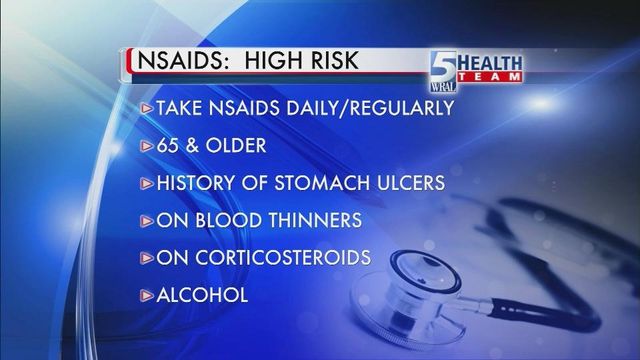Common painkillers can carry risk for some
Painkillers known as NSAIDS can carry heavy risks for heart attacks, strokes or even death.
Posted — UpdatedMany people reach into the medicine cabinet for relief from a headache, backache or arthritis. Some of the medicines that ease that pain – known as "non-steroidal anti-inflammatory drugs" or NSAIDs – can carry heavy risks for heart attacks, strokes or even death.
When NSAIDs were classified for over-the-counter sales, Dr. Allen Mask said, doctors worried about their misuse, and some of those fears have come true.
The medications – drugs like ibuprofen, naproxyn and ketoprofen – are available in both prescription and over-the-counter versions.
Also at risk are:
- People who take NSAIDs every day or on a regular basis;
- Those older than 65 years of age;
- People with a history of stomach ulcers; or
- People on blood thinners or corticosteroids (like prednisone).
- Alcohol also increases the risk.
It is important to remember that all NSAIDs, except for aspirin, increase the risk of heart attack and stroke. These serious side effects can occur withing a few weeks of the start of using NSAIDs and may rise the longer people take non-aspirin NSAIDs.
The best advice is always to talk to a doctor about how the use of medicines may interact with existing cardiovascular or stomach conditions. As a general rule, those with these risk factors should avoid NSAIDs. Even those without risk factors should not take NSAIDs more than 10 days in a row without consulting a doctor.
NSAIDS should be taken at the lowest effective dose for the shortest amount of time necessary, and they should never be combines.
Many medicines that claim to relieve multiple symptoms, like cold or flu medications, may contain NSAIDs, so be sure to read the label.
• Credits
Copyright 2024 by Capitol Broadcasting Company. All rights reserved. This material may not be published, broadcast, rewritten or redistributed.





